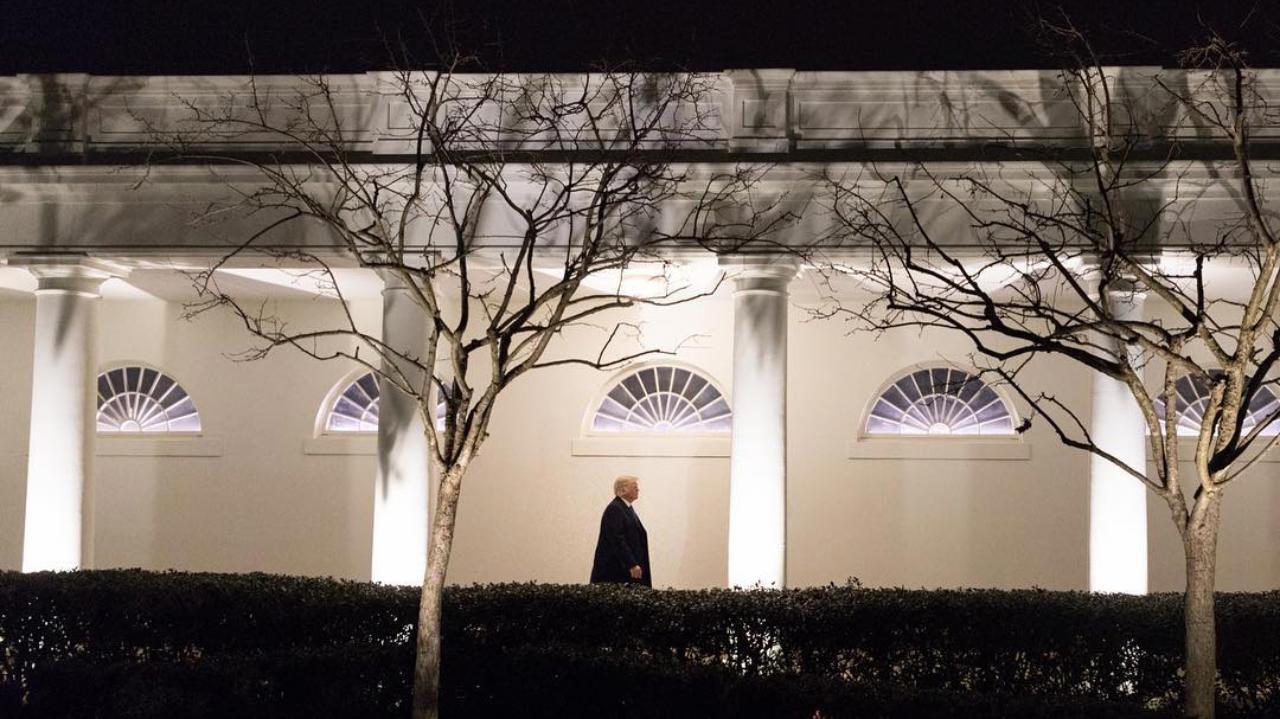
President Donald Trump’s administration cannot miss any more opportunities if it is going to carry out the intention for which, above all else, Americans elected him: To get the United States out of endless foreign wars, and rebuild and reindustrialize the nation.
If the big corporate tax cut is all there is to the Trump Administration’s economic policy, then the President and the nation are facing an oncoming financial crash, and another so-called “Great Recession” much worse than the last. The huge corporate debt and stock bubble already created with central bank free money for a decade, now surrounded by what analysts are calling the “everything bubble” of other exploding debt categories, cannot stand the smallest coming interest rate increases. Corporate tax cuts will not save it, but only blow it up faster until it explodes. The Wall Street and London megabanks are scrambling out of this debt by securitizing it — packaging and selling it on — knowing it is not payable. U.S. banks’ securitization of debt — corporate junk, auto and credit card debt, student debt, etc. — has grown by $1.1 trillion or 25% just during 2017.
Plainly the White House and Congress have to defy Wall Street’s old wives’ tales about the Glass-Steagall Act, and reinstate that act immediately, to isolate commercial banking from this casino speculation before it explodes. And put productive Federal credit into new infrastructure and scientific drivers for the economy, rebuilding productivity and productive, well-paid employment.
But there is the rub. This weekend’s Camp David Presidential meeting with Republican leadership, supposed to be centered on a $1 trillion infrastructure plan, appears to show little discussion and no progress. Desperate follies are being surfaced — diverting perhaps $2 billion in cancelled U.S. aid to Pakistan into building roads and bridges! — suggesting the White House has absolutely no idea as to how an infrastructure capital budget could be created, or funded. Even the disaster reconstruction aid for the hurricane-ravaged states and territories — which involves some critical power and storm-control infrastructure — has been held up with no action for nearly three months.
Yet West Virginia’s governor, when he gives his State of the State on Wednesday, will build on a long-term commitment of $80 billion in industrial investment he has, from one Chinese company backed by a state-owned bank in China. Maryland’s governor, carrying out feasibility for a maglev line from Baltimore to Washington, has a $5 billion commitment from Japan. Is there a mystery secret?
No, rather there is China’s truly win-win invitation to the United States to join the Belt and Road Initiative of great infrastructure projects; and an increasing “competition” by Japan to use its great infrastructure engineering capacities in and for other countries, in some cases with China. For building advanced nuclear reactors, Russia and South Korea are doing the same thing.
And there are Treasury Secretary Alexander Hamilton’s methods of generating credit for new infrastructure and manufacturing technologies, laid out in 21st-Century form by Lyndon LaRouche. Both China and Japan employ these national credit methods. The offer to join in the Belt and Road Initiative is there, extended by President Trump’s good friend President Xi of China. This is fully laid out in America’s Future on the New Silk Road, the pamphlet on LaRouche’s economic “Four Laws” being distributed to the entire Congress.
The President’s own State of the Union Jan. 30 will be the last chance for this win-win strategy to come from the Administration; and Congress must, in any case, take it up and legislate it. Without that and Glass-Steagall, watch the giant Wall Street bubble of debt and “financial engineering” through weeks or months more of explosive expansion, until it crashes down on the U.S. economy.
SUPPORTING MATERIAL No Progress on Infrastructure Plan at Camp David MeetingJust three weeks from President Trump’s State of the Union Address, it is clear that this past weekend’s GOP leadership meeting with the President at Camp David did not focus on getting Congressional support for a plan to build new U.S. economic infrastructure. Instead, foolish ideas are being surfaced which smack of desperation.
The only thing confirmed by White House officials is that the President, once again, told the Congressional leaders he does not believe that public-private partnerships (PPPs) work for important new infrastructure projects. But at the same time, the Washington Post reported that advisor, National Economic Council Director Gary Cohn gave an all-PPP presentation to the Congressional leaders on Saturday. A Washington Examiner report holds that Cohn promoted underground high-speed rail lines which “won’t cost the taxpayers anything” because the private sector will build them — likely referring to Elon Musk, whom Cohn might want to call Little Tunnel Man. Sen. Rand Paul said he was going to introduce a bill to divert the foreign aid being withheld by Trump from Pakistan, to “building bridges and railroads.” This is, at most, $2 billion. Senator Paul was not at the Camp David meeting, but Trump tweeted, “Good idea, Rand!”
Rep. Rodney Frelinghuysen (R-NJ), Chairman of the House Appropriations Committee, on Jan. 4 came strongly to the defense of Amtrak’s Northeast Corridor Gateway Project, saying “it will be the Committee’s responsibility to see that such national priorities are met.” The Department of Transportation recently disowned a “50-50” agreement for the Gateway Project’s $29 billion estimated cost, calling it “a project of 90% local significance” only.
How might Franklin Roosevelt’s Reconstruction Finance Corporation have handled this? It might have extended a 20-year, 2% loan of $30 billion to the Metropolitan Transportation Authority, effectively doubling the MTA’s capital budget so that it could build the new Hudson Tunnels and bridges and repair Hurricane Sandy’s seawater damage which is ruining the old ones, among other improvements. The MTA, which is assigned $5.5 billion/year in special tax revenue, has already allocated $2.7 billion over five years to pay interest on a Gateway Project loan. It would have to increase that only slightly to pay the Federal loan interest, while increased economic activity from improvement of the Amtrak Northeast Corridor through the nation’s largest metropolitan area, would enable the states of New York, New Jersey and Connecticut to repay the loan principal over 20 years rather than $15 billion now.
Just as a Reconstruction Finance Corporation — borrowing with Treasury guarantee for a targeted capital budget — could do this, so could an infrastructure bank capitalized from the Treasury holdings of U.S. commercial banks, savers, and foreign holders particularly China and Japan. Tax backing for large-scale credits is necessary, and thus advisor Gary Cohn’s sometimes repeated proposal to raise the Federal gasoline tax to fund infrastructure, is important. But there is no indication whether Cohn repeated this at Camp David.
Share this:- More




![Revelation (de La Vega Cats) by [Dane, Lauren]](/ai/054/020/54020.jpg)
